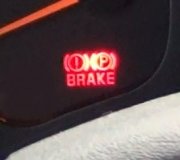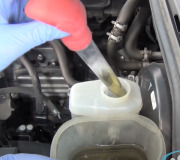next, rear shoes, adjusters, and springs were replaced. Mechanism was lubricated w/ high temp grease. Again pedal got firmer and brakes felt smoother but heavy just the same.
recently stumbled onto several websites suggesting that excessive pedal effort is often due to worn shoes and drums. Since the shoes were just done would replacing the drums be the next logical step?
Additional Note:
when car is in park brake pedal moves easily enough - not overly hard or soft. When braking it does not feel rock hard like a bad booster or when the engine is not running. When driving, the pedal travels normally but brakes require a lot of effort to operate causing my right leg to get tired.
Monday, April 19th, 2010 AT 4:02 PM


